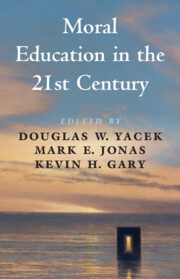Book contents
- Moral Education in the 21st Century
- Moral Education in the 21st Century
- Copyright page
- Contents
- Contributors
- Acknowledgments
- Chapter 1 Why Does Moral Education Matter in the 21st Century?
- Part I Historical Insights for Contemporary Moral Education
- Chapter 2 Plato’s Significance for Moral Education
- Chapter 3 Neo-Aristotelianism and Moral Education
- Chapter 4 Neoskepticism and Moral Education
- Chapter 5 Nietzsche and Moral Education
- Chapter 6 Neo-Kantianism and Moral Education
- Part II New Approaches to Moral Education
- Part III Responses to Contemporary Moral Problems
- Index
- References
Chapter 5 - Nietzsche and Moral Education
from Part I - Historical Insights for Contemporary Moral Education
Published online by Cambridge University Press: 01 June 2023
- Moral Education in the 21st Century
- Moral Education in the 21st Century
- Copyright page
- Contents
- Contributors
- Acknowledgments
- Chapter 1 Why Does Moral Education Matter in the 21st Century?
- Part I Historical Insights for Contemporary Moral Education
- Chapter 2 Plato’s Significance for Moral Education
- Chapter 3 Neo-Aristotelianism and Moral Education
- Chapter 4 Neoskepticism and Moral Education
- Chapter 5 Nietzsche and Moral Education
- Chapter 6 Neo-Kantianism and Moral Education
- Part II New Approaches to Moral Education
- Part III Responses to Contemporary Moral Problems
- Index
- References
Summary
In this chapter, I argue that the philosophy of Friedrich Nietzsche is of central importance to the theory and practice of moral education in the 21st century. To make this case, I examine an oft-neglected text of Nietzsche’s early philosophical work: Schopenhauer as Educator. I argue that this text advances a theory of moral education with three key components: (i) a view about the particular cultural context of moral education in modernity, (ii) a conception of the proper aims of moral education, and (iii) an account of the appropriate pedagogical methods of moral education. I then discuss the kind of theory Nietzsche advances. I show that Nietzsche’s theory fits within a broadly exemplarist outlook, though it expands the standard theory and practice of exemplarist moral education in important ways. I argue that Nietzsche’s theory of moral education suggests two novel forms of exemplarist motivation – self-exemplarism and fallibilistic exemplarism – and further specifies the psychological conditions for moral aspiration and transformation to occur in educational spaces.
- Type
- Chapter
- Information
- Moral Education in the 21st Century , pp. 69 - 93Publisher: Cambridge University PressPrint publication year: 2023

